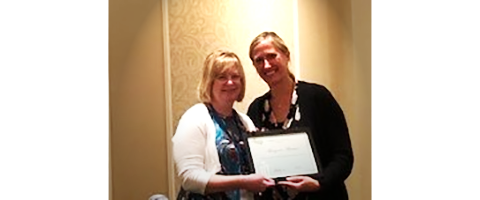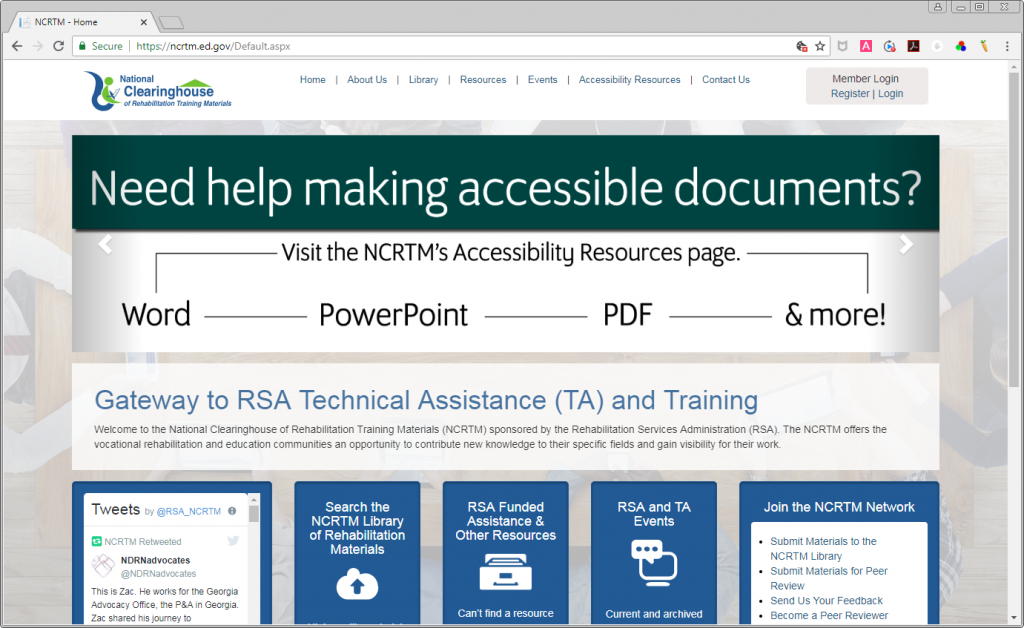For National Disability Employment Awareness Month, check out the many resources available in the National Clearinghouse of Rehabilitation Training Materials (NCRTM), funded by the Rehabilitation Services Administration (RSA).
We offer pointers for finding up-to-date resources in the NCRTM library and showcase a few products from the RSA-funded technical assistance (TA) centers.
The Workforce Innovation and Opportunity Act (WIOA) supports a vision that people with disabilities, including those with the most significant disabilities, can work in competitive and integrated employment.
The NCRTM is one of the first places you should go to find promising and effective practices that have been shared by RSA-funded projects and TA centers so that vocational rehabilitation (VR) personnel, employers, families and individuals with disabilities can improve employment outcomes for people with disabilities.
We constantly add new resources to the NCRTM library, which you can search for by keyword or topic. You can also quickly search the library by clicking on icons that link to RSA information and guidance, products developed with RSA funding, RSA-funded TA centers, peer reviewed products and sign language interpreter resources.
Whether you are a person with a disability, a VR professional or service provider, an educator, interpreter, or in business, the NCRTM contains useful, interesting and accessible resources to learn more about a topic or share ideas and resources with others.
The following resources from three RSA-funded TA centers demonstrate the type of information you can check out as you explore ways to celebrate National Disability Employment Awareness Month.
Job-Driven Vocational Rehabilitation Technical Assistance Center (JDVRTAC)
JD-VRTAC has identified, adapted, embedded and sustained job-driven practices in order to lead to improved employment outcomes for people with disabilities. Their lasting contributions include toolkits such as:
- Business Engagement Toolkit
- Useful information and tools to optimize interactions between employers, VR, and other organizations
- Employer Supports Toolkit
- Useful information and tools for services provided by VR in response to businesses’ needs
- Labor Market Information Toolkit
- Useful information and tools to use labor market information to assist job-seekers and understand employer hiring trends
- Customized Training Toolkit
- Useful information and tools for programs and partnerships to meet employer or industry needs for skilled workers
- Contains the Paid Work Experiences Toolkit that explains internships, pre-apprenticeships and apprenticeships and includes case studies and highlights models across the U.S.
Though funding for this JDVRTAC ended September 2018, the Workforce Innovation Technical Assistance Center (WINTAC), in partnership with the Institute for Community Inclusion and the University of Washington, will continue to provide technical assistance to VR agencies in the topic areas covered by the JDVRTAC through September 2020.
 Vocational Rehabilitation Technical Assistance Center for Targeted Communities (VRTAC-TC) (Project E3TC)
Vocational Rehabilitation Technical Assistance Center for Targeted Communities (VRTAC-TC) (Project E3TC)
Project E3TC provides technical assistance so state VR agencies and their community-based partners can address barriers to VR participation and competitive integrated employment of historically underrepresented and economically-disadvantaged groups of individuals with disabilities.
- Project E3TC Poverty Resources
- Collects resources on targeted populations representing high-leverage groups who are underserved or achieved substandard performance with needs in economically-disadvantaged communities across the country
- Highlights poverty research and resources that are updated regularly.
- The Forerunners (30-minute film)
- Tells the stories of people with disabilities working successfully as information technology professionals in Chicago
- Helps reduce stigma around hiring people with disabilities through use of a 30-minute, award-winning MIND Alliance film funded by Hunter College – City University of New York and developed jointly with Southern University of Baton Rouge
- Has helped change employer attitudes against people with disabilities in the workplace
 Rehabilitation Training and Technical Assistance Center for Program Evaluation and Quality Assurance (PEQATAC)
Rehabilitation Training and Technical Assistance Center for Program Evaluation and Quality Assurance (PEQATAC)
PEQATAC helps state VR agencies improve performance management by building their capacity to carry out high-quality program evaluations and quality assurance practices that promote continuous program improvement.
- Vocational Rehabilitation Program Evaluation and Quality Assurance Program
- Certification program intended to increase state VR agencies’ evaluators and quality assurance specialists numbers and qualifications
- PEQA Evaluation Studies Certificate Program’s fifth cohort started the online certificate program Oct. 1, 2018
- PEQA Certificate Program has 34 individuals from 29 states actively participating in the coursework and capstone projects to date
- 11th Annual Summit Conference on Performance Management Excellence
- VR professionals from 50 states attended September 2018 summit in Oklahoma City, Oklahoma.
- Attendees collaborated and shared resources for quality employment outcomes from state-federal vocational rehabilitation services to people with disabilities.
- Attendees learned evaluation results and research outcomes from practitioners and researchers and gained insight on VR agencies’ strategies for internal controls, program evaluation, skills gains, and other workplace integration processes.

The first PEQA graduate, Margaret Alewine from South Carolina VR, presented her Capstone project, which designed to enhance the Comprehensive Statewide Needs Assessment (CSNA) related to services for youth and students, at the Summit Conference. She received her certificate at the completion of the conference.
Blog articles provide insights on the activities of schools, programs, grantees, and other education stakeholders to promote continuing discussion of educational innovation and reform. Articles do not endorse any educational product, service, curriculum or pedagogy.


